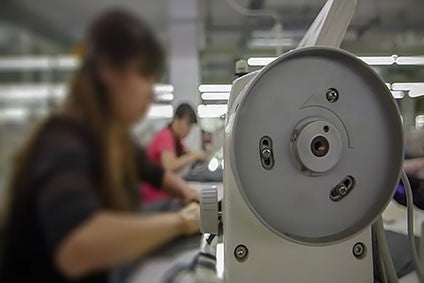
In a webinar aimed at informing and advising on the best way to reshore production, Elliot Barlow, UKFT’s manufacturing consultant said brands are starting to examine whether the overall cost of bringing a finished product into the UK outweighs the cost and complexity of having it produced locally.
Barlow said while UK brands have had plans to reshore on the agenda for the last decade, the issue is now more prevalent due to taxes, tariffs, and duties linked to Brexit as there are a lot of additional costs the business needs to bear and those indirect costs are eating away at margins.
Speaking on the webinar this morning (6 April), Barlow added there are several other reasons brands are looking at reshoring production, including greater control over the quality of the finished product; greater visibility of the supply chain, which can have moral and ethical benefits; lowering of carbon footprint as a result of the product having to travel a shorter distance before it reaches the end consumer; and the convenience, flexibility and speed to market producing locally allows.
But, he said, the complexity of reshoring production can vary as with overseas makers, brands are often dealing with an agent or middleman who deals with the various factories.
“UK manufacturing and UK suppliers – the qualities that they can offer – if the price overall is similar, then there is greater opportunity in the UK,” Barlow said. “A lot of brands we talk to are very interested in reshoring but they may been working with international suppliers for a long time and so become very accustomed to working directly with an agent or representative and they may not have the internal skills and capabilities to deal with cut make trim factories and the necessary developmental stages.
“Businesses are interested, but there are some key learnings that need to take place about how to work with UK suppliers.”

US Tariffs are shifting - will you react or anticipate?
Don’t let policy changes catch you off guard. Stay proactive with real-time data and expert analysis.
By GlobalDataSome key factors Barlow said must be considered ahead of a plan to reshore some parts or all of the production include:
Does it add value to your products?
“It can be cheaper to source abroad. But the perceived value of UK-produced items is higher. Also, someone making it abroad, in a factory where they are being paid a small amount to do it because they have to, rather than that they want to, can mean it’s being done belligerently which will lessen the value of your items.”
Specialisms
“While one of the benefits of producing in the UK is that the production and shipping stages are fewer which lowers the risk of the supply chain breaking down if something like Covid should occur, one of the benefits of producing overseas is that often factories are able to offer several production services. That may not be the case in the UK. A factory may be a specialist in producing coats, but not necessarily have the know-how for handling silk. Choose each factory based on what they are excellent at.”
Split services
“Avoid putting your eggs in one basket; if the one factory you rely on to do all of your production fails, you risk your product getting to market on time. It may even be that you rely on local producers for seasonal products but rely on overseas, cheaper factories for your core goods where there is no urgency on lead times. This will allow you to boost speed to market.”
Docket size
“Overloading a manufacturer could see them struggle to fulfill your order. Understand the factory’s capabilities and limitations so you are able to set realistic and achievable orders.”
Earlier this year, UK-EU data revealed Brexit to be a lose-lose deal for the apparel industry.



